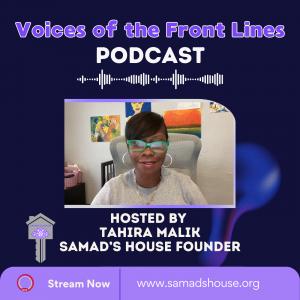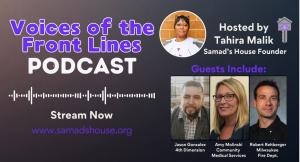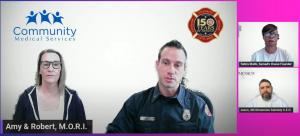Milwaukee's Samad’s House Launches Voices of the Front Lines Podcast - Elevating Heroes Preventing Drug Overdose Deaths
Intimate, honest discussions explore the emotional realities of this public health crisis, fostering a deeper understanding and empathy for all those affected
MILWAUKEE, WI, UNITED STATES, October 27, 2025 /EINPresswire.com/ -- Samad’s House today launched Voices of the Front Lines, a compelling new podcast hosted by its founder, Tahira Malik. This podcast shines a light on the unsung heroes— outreach workers, peer support specialists, and advocates for supportive and compassionate care —who work tirelessly to prevent drug overdose deaths in Milwaukee.
In 2024, Milwaukee County tragically lost 450 lives to overdoses, with Black Milwaukeeans dying at almost twice the rate of White residents, despite the races using drugs at similar rates. But lives are being saved thanks to community resources like Samad’s House, one of the Midwest’s leading sober living homes for women, and initiatives and support from the city and county governments. Also critical is the dedication of frontline workers and the expansion of harm reduction services, including naloxone distribution and fentanyl test strips.
Voices of the Front Lines is dedicated to amplifying the voices of those who are making a difference, often against incredible odds.
In the debut episode, listeners learn about the Milwaukee Fire Department’s innovative Milwaukee Overdose Response Initiative (MORI), which reviews overdose survivor cases daily and sends teams to provide support and resources. The episode also reveals the heartbreaking reality that some survivors are told there are no residential recovery beds available, and the gratifying moments when individuals make positive changes and thrive.
“On this podcast, we’ll share our challenges, triumphs, and the real-world impact of harm reduction in our communities,” Malik explains. “Each episode will spotlight personal stories, pivotal events, and the urgent need for equitable funding from the government, private sector, and philanthropic organizations to support programs like Samad’s House. These programs provide the tools and opportunities for individuals to recover, thrive, and create their own success stories.”
In the premier episode, available at www.samadshouse.org and on Amazon Music, Apple, and Spotify, Malik shares her deeply personal journey from addiction and incarceration to recovery and the creation of Samad’s House. “I am fully committed to stopping overdose deaths and helping women recover, thrive, and succeed in achieving their goals. And so are the guests who are gathered here today,” she says, in opening the podcast episode.
Malik also issues a Call to Action, urging government leaders, private industry, and philanthropic organizations to continue to allocate funding equitably. “Every individual, every family, and every community deserves the chance to thrive and build a brighter future,” she proclaims. “Together, we can ignite change, transform Milwaukee, and inspire a stronger, more compassionate America. The time to act is now.”
The episode features raw, unfiltered conversations with guests who share their experiences on the front lines of the overdose crisis and the impact of life-saving, compassionate harm reduction services. One guest, Jason Gonzalez, founder and CEO of 4th Dimension Sobriety, a Milwaukee-based recovery community, cited the biggest challenge that he faces in helping people with recovery.
“There's just so many people that are in need,” Gonzalez says. “We're trying to do the best that we can…We're trying to manage an unmanageable disease and just try to hold people's hands and walk alongside of them while they're going through it. It's difficult.” He notes that new arrivals have all kinds of things on their minds, from paying for treatment to finding a permanent place to live, getting a job, getting their children back, and “just life, and life’s consequences.” He asserts that we “hold them steady as much as we can during that period…remind them that they made a commitment.”
Another guest is Robert Rehberger, a lieutenant with the Milwaukee Fire Department and a key member of the MORI unit, which partners with public health agencies, first responders, and community organizations to reduce overdoses. Rehberger says one of the biggest challenges is getting people into residential recovery facilities. “The funding is very difficult at times to get someone there and challenging just based on how the insurances work,” he says. “I think that's probably the biggest challenge is when someone is ready to take a step further.”
Amy Molinsky, a clinical substance use counselor and certified peer support specialist with MORI, agreed with Rehberger. “(We) look people in the eyes and tell them ‘I know you want help’ and we're going to keep coming back until we can get you in there. But I know when I say that I’ll see you later that day, that I might not see them again. That's hard for me because I found recovery, and I want everybody to be able to find it. I want everybody to be able to have what I have because it's beautiful and amazing and wonderful, and not everybody gets it.”
Rehberger recalls one of his most gratifying moments. He and Molinsky had been to visit a man twice after he had survived an overdose, and each time the man insisted he was fine.
“This third time I went there he said I'm fine and I said, ‘I don't think you are fine. You said that to me two other times .’ And he kind of changed his tune from that point on. He had been through many treatment times before…We took him to a detox facility. When he got out, we took him to dinner because he had like a one or two day lapse between when he got released from detox to go to his treatment facility, and we took him to dinner, and we were there to help him through the way.”
Rehberger says he's kind of private and doesn't share everything, but we kept up with him by checking in every few months. We celebrated one year with him with a cake. He's working now, working out, and that one's just special to me because it was one of my first ones.”
Further, Molinsky says that “just love and compassion’ would improve the care and safety of people who use drugs. Agreeing, Gonzalez adds, “We have to treat everybody with dignity. And if we did that, I think that policies would probably change. I think funding
would change. I think that how people are treated just on the street or in your own family, that would change.”
For more of this revealing conversation, listen to the full podcast at: www.samadshouse.org
About Samad’s House
Samad’s House is a sober living home for women recovering from addiction. Samad’s House is also a solution-based harm reduction organization that educates communities, emphasizing that everyone has the ability to save lives by learning the proper use of naloxone and fentanyl test strips. To learn more details on how you can support Samad’s House, please visit www.samadshouse.org. Find us on LinkedIn (https://www.linkedin.com/company/samad-s-house/?viewAsMember=true).
Michael K. Frisby
Frisby & Associates
+1 202-625-4328
email us here
Visit us on social media:
LinkedIn
Facebook
Legal Disclaimer:
EIN Presswire provides this news content "as is" without warranty of any kind. We do not accept any responsibility or liability for the accuracy, content, images, videos, licenses, completeness, legality, or reliability of the information contained in this article. If you have any complaints or copyright issues related to this article, kindly contact the author above.





